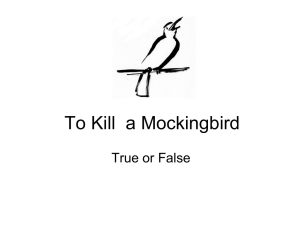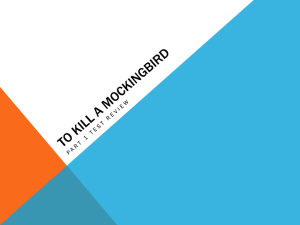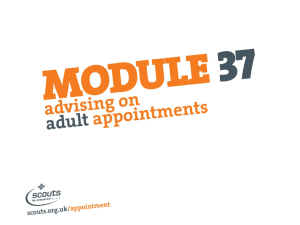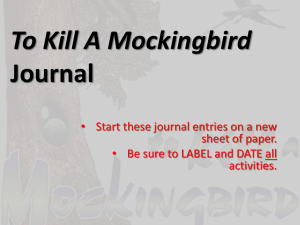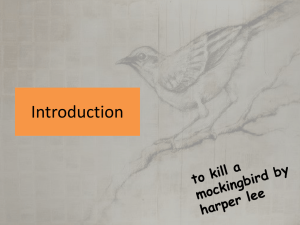Tension between formal and informal education
advertisement
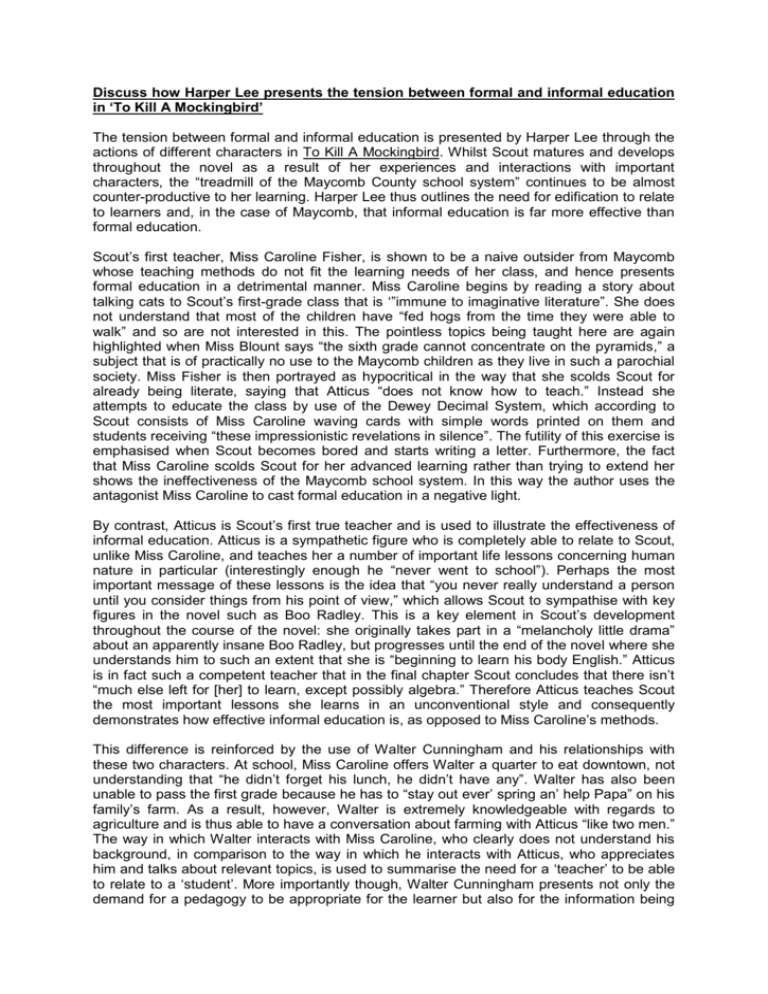
Discuss how Harper Lee presents the tension between formal and informal education in ‘To Kill A Mockingbird’ The tension between formal and informal education is presented by Harper Lee through the actions of different characters in To Kill A Mockingbird. Whilst Scout matures and develops throughout the novel as a result of her experiences and interactions with important characters, the “treadmill of the Maycomb County school system” continues to be almost counter-productive to her learning. Harper Lee thus outlines the need for edification to relate to learners and, in the case of Maycomb, that informal education is far more effective than formal education. Scout’s first teacher, Miss Caroline Fisher, is shown to be a naive outsider from Maycomb whose teaching methods do not fit the learning needs of her class, and hence presents formal education in a detrimental manner. Miss Caroline begins by reading a story about talking cats to Scout’s first-grade class that is ‘”immune to imaginative literature”. She does not understand that most of the children have “fed hogs from the time they were able to walk” and so are not interested in this. The pointless topics being taught here are again highlighted when Miss Blount says “the sixth grade cannot concentrate on the pyramids,” a subject that is of practically no use to the Maycomb children as they live in such a parochial society. Miss Fisher is then portrayed as hypocritical in the way that she scolds Scout for already being literate, saying that Atticus “does not know how to teach.” Instead she attempts to educate the class by use of the Dewey Decimal System, which according to Scout consists of Miss Caroline waving cards with simple words printed on them and students receiving “these impressionistic revelations in silence”. The futility of this exercise is emphasised when Scout becomes bored and starts writing a letter. Furthermore, the fact that Miss Caroline scolds Scout for her advanced learning rather than trying to extend her shows the ineffectiveness of the Maycomb school system. In this way the author uses the antagonist Miss Caroline to cast formal education in a negative light. By contrast, Atticus is Scout’s first true teacher and is used to illustrate the effectiveness of informal education. Atticus is a sympathetic figure who is completely able to relate to Scout, unlike Miss Caroline, and teaches her a number of important life lessons concerning human nature in particular (interestingly enough he “never went to school”). Perhaps the most important message of these lessons is the idea that “you never really understand a person until you consider things from his point of view,” which allows Scout to sympathise with key figures in the novel such as Boo Radley. This is a key element in Scout’s development throughout the course of the novel: she originally takes part in a “melancholy little drama” about an apparently insane Boo Radley, but progresses until the end of the novel where she understands him to such an extent that she is “beginning to learn his body English.” Atticus is in fact such a competent teacher that in the final chapter Scout concludes that there isn’t “much else left for [her] to learn, except possibly algebra.” Therefore Atticus teaches Scout the most important lessons she learns in an unconventional style and consequently demonstrates how effective informal education is, as opposed to Miss Caroline’s methods. This difference is reinforced by the use of Walter Cunningham and his relationships with these two characters. At school, Miss Caroline offers Walter a quarter to eat downtown, not understanding that “he didn’t forget his lunch, he didn’t have any”. Walter has also been unable to pass the first grade because he has to “stay out ever’ spring an’ help Papa” on his family’s farm. As a result, however, Walter is extremely knowledgeable with regards to agriculture and is thus able to have a conversation about farming with Atticus “like two men.” The way in which Walter interacts with Miss Caroline, who clearly does not understand his background, in comparison to the way in which he interacts with Atticus, who appreciates him and talks about relevant topics, is used to summarise the need for a ‘teacher’ to be able to relate to a ‘student’. More importantly though, Walter Cunningham presents not only the demand for a pedagogy to be appropriate for the learner but also for the information being taught to be relevant in itself, as Walter needs to know about farming in order to make a living, whereas literacy is rather unimportant for him. The fact that he has learnt all of the important skills he needs by informal education sustains Harper Lee’s teaching style preference. Miss Gates is used later in the novel to reinforce this view. As Scout’s next schoolteacher she is similar to Miss Caroline; she is shown to be highly hypocritical and again, teaches irrelevant material to her students. In class Miss Gates speaks about Hitler as a maniac and gets “real red in the face” explaining his views on the Jewish people and claims that in America they “don’t believe in persecuting anybody.” However Scout recalls that coming out of the courthouse she heard Miss Gates saying that black people “were gettin’ way above themselves” and is confused by “how you can hate Hitler so bad an’ then turn around and be ugly about folks at home.” Not only is Miss Gates shown to be hypocritical, she also provides her class with extraneous information when she attempts to explain the difference between a democracy and dictatorship, rather advanced concepts for second-grade pupils. By aligning yet another representative of formal education with negative traits, Harper Lee reiterates the inadequacies of this method of teaching. Meanwhile Calpurnia contrasts this by playing a similar role to Atticus in Scout’s development by teaching her a number of moral lessons. A clear example of this is when Scout vocally expresses her outrage in the way in which Walter Cunningham pours syrup all over his dinner. Calpurnia teaches Scout that it doesn’t “matter who they are, anybody sets foot in this house’s...comp’ny” and warns her not to remark on others’ ways as if she is “so high and mighty.” Hence Calpurnia cautions Scout against hypocrisy, which not only is an important life lesson but also is a direct juxtaposition to the ways of Scout’s schoolteachers and thus maintains the presentation of this tension between these teaching styles. Moreover Calpurnia’s educative techniques are also effective in helping Scout to learn skills generally taught formally, such as the ability to write. Merely by “scrawling the alphabet firmly across the top of a tablet, then copying out a chapter of the Bible beneath it” and getting Scout to reproduce her chirography “on rainy days” she manages to teach her how to write before she even begins school. On the other hand, under the Maycomb school system, Scout “won’t learn to write until [she is] in the third grade.” This comparison upholds the idea that informal education is much more worthwhile than formal education. By using a variety of characters to exemplify either the downfalls of formal education and/or the effectiveness of informal education, Harper Lee adduces the tension between these two methods of teaching and implies that moral lessons are far more worthwhile than learning specific, unimportant skills. Bateman 5A Word Count = 1197

